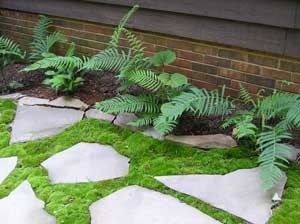
Growing a thick, lush carpet of moss gives a shade garden a mystical, almost surreal feeling. The dark, velvety aesthetic appeal of moss is evident just by looking at it, but its resiliency and the fact that it requires almost no maintenance once it's established is what really makes it an attractive addition to the garden. Here is what you need to know to get moss growing in your garden.
Moss can tolerate extremes in temperature and moisture. Even during periods of cold weather, moss stays a rich, green color. Mosses have a built in safety system. They can experience excessive heat or lack of rain without suffering any permanent damage by going dormant until better conditions come along. This makes them virtually maintenance-free once they become established.
Once it settles in, moss needs no mowing, no de-thatching, very little weeding or fertilizer and no pesticides. These characteristics, along with its obvious visual appeal, make it a popular alternative to grass and other groundcovers in shady areas.
If you're collecting moss from nature, remove only small patches in un-noticeable areas. Don't collect moss from public parks or private land unless you have been given permission. The best idea is to start your own small culture for transplanting or purchase plugs from a garden center or nursery. Local nurseries are best, but online sources like Moss Acres (www.mossacres.com), also offer plugs and starter kits. Moss may appear dry and shriveled upon receipt, but a thorough watering should restore the plants to their normal appearance in a few minutes.
There are a few mosses that don't mind a little sun, but most mosses need dark shade and ample amounts of humidity. The best way to choose a variety is to determine what type of habitat you have and consult a guide to find out which types grow on rocks, gravel, trees, etc. It's important to mimic the species' natural forest conditions as closely as possible. The site's soil should be acidic with a pH of around 5.5. Look for some moss growing nearby and choose a site with similar conditions.
Transplant your moss onto soil that's been raked to give the plant a foothold. The best sites are north facing slopes under heavy shade trees. You can put down sheets or plugs of moss the same way you would sod your yard. Simply cut a square, lift it out of the ground with a spatula, place it in the new location and give it some water.
Instead of transplanting, many gardeners recommend using a blender to mix moss and beer or buttermilk and then spread it in the desired habitat. I have found that direct transplantation works better. If you do try the blender method, remember that Scotch and Irish moss are not a true non-vascular moss and the blender method will kill them.
The most important thing to remember is to water or mist the moss regularly for the first three weeks or more. This can be done any time of the day and should be done whenever the moss looks or feels dry. A garden hose with a misting nozzle works excellently for this, of use a hand held spray bottle for smaller areas. Not only does a misting keep the moss and soil moist, but it also dramatically raises humidity and lowers temperature, helping the mosses thrive.

About The Author: Ellen Brown is an environmental writer and photographer and the owner of Sustainable Media, an environmental media company that specializes in helping businesses and organizations promote eco-friendly products and services.
Add your voice! Click below to comment. ThriftyFun is powered by your wisdom!